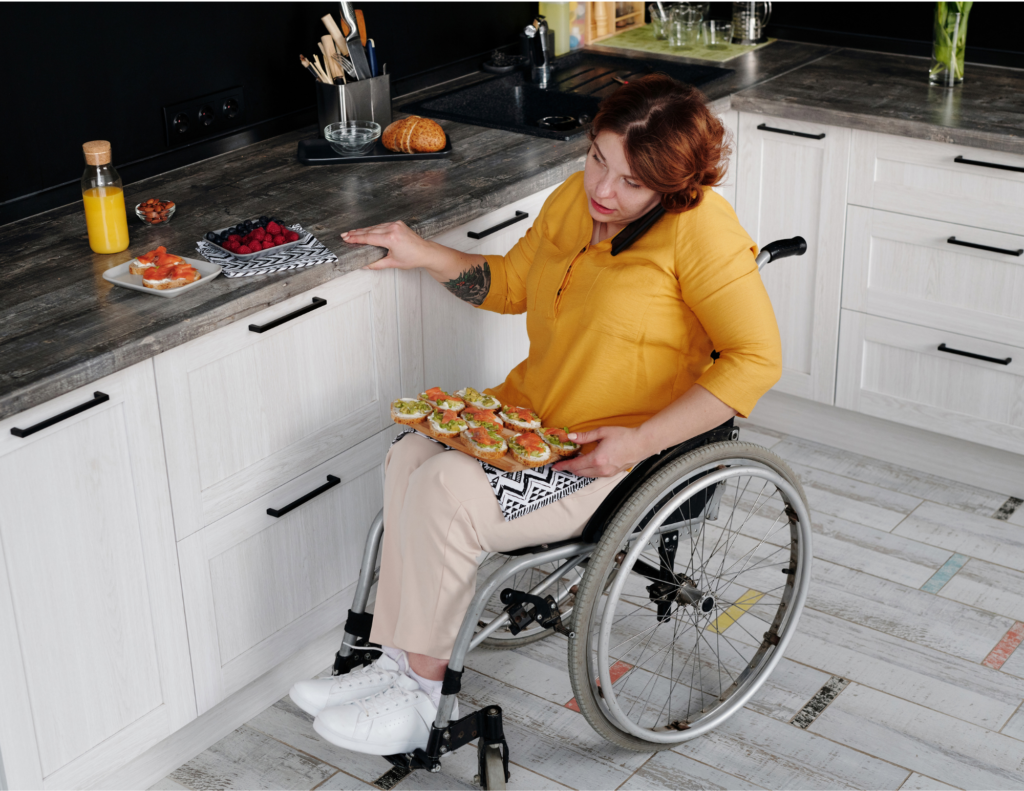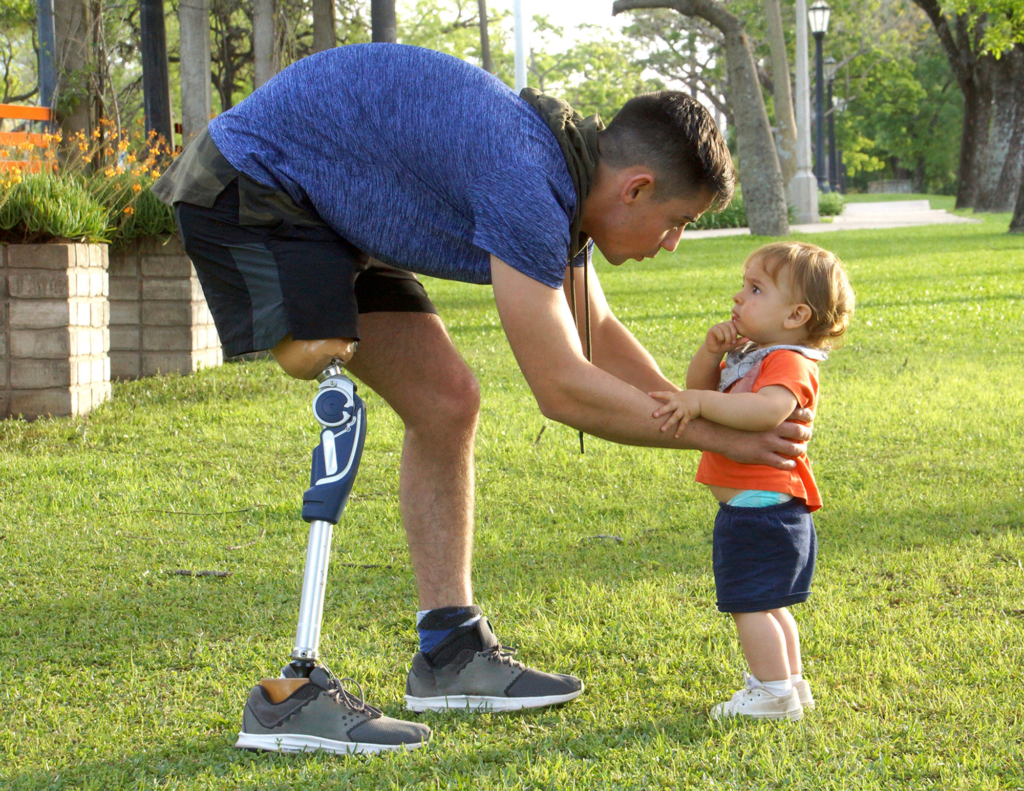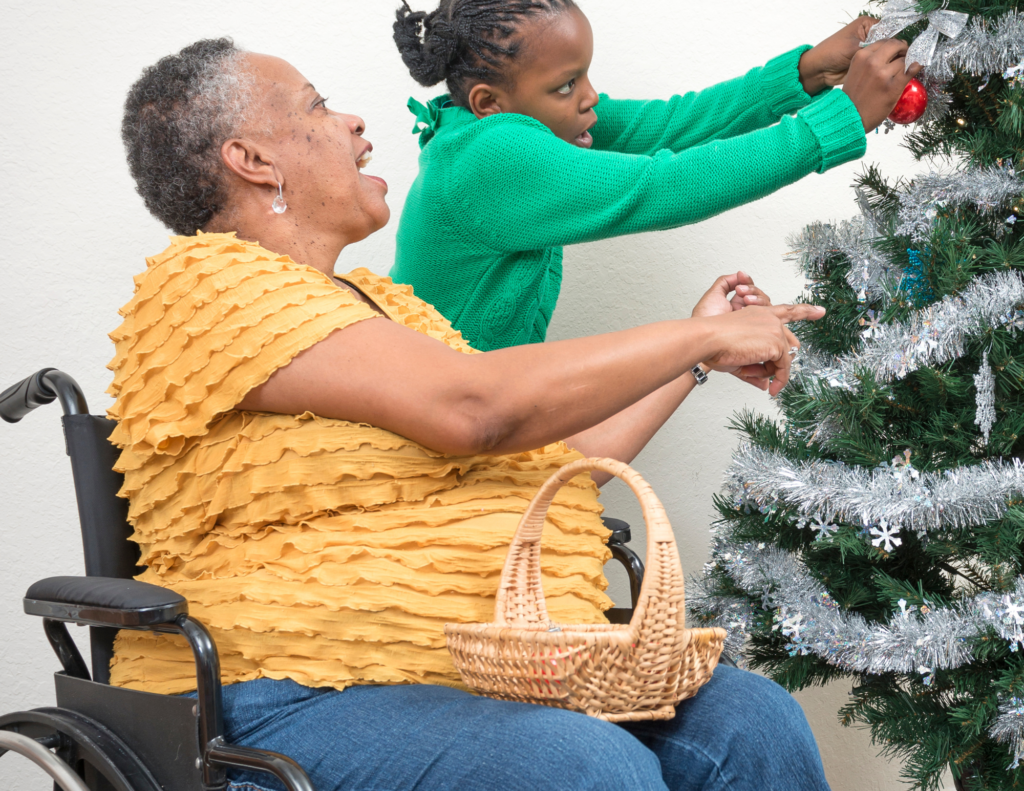Blog
Disability Does Not Equal Incompetence: Removing Biases Against Parents and Caregivers with Disabilities in Child Welfare
Parenting is not an easy task for any one or two people to do alone, and parents without disabilities rely on the support of family, friends, public services, etc., to help navigate parenthood and assist them with the responsibilities that come with it. While we often praise and encourage parents to seek these formal and informal supports, this need becomes stigmatized for parents with disabilities—a population of about 4 million or 6.2 percent of parents in the United States with children under the age of 18. Birth parents, caregivers and prospective foster/adoptive parents with disabilities are often overly scrutinized in child welfare for needing extra parenting support. This scrutiny often leads to discriminatory practices, which can leave them feeling hopeless, alone and ashamed to ask for help out of fear of losing their children or being labeled incompetent, inadequate or “unfit.”
While children with disabilities are overrepresented in child welfare, it is important to understand that these children must grow up and most will become adults with disabilities—many who desire to live fulfilling lives with families of their own.
However, societal stereotypes and biases within child welfare lead us to believe that this may not always be possible. Having a disability, whether physical, intellectual, psychiatric, etc., should not be an automatic disqualification from the gift of parenthood—especially as this type of discrimination is illegal. It is our responsibility to ensure these parents or future parents are given equal opportunities and access to raise families with as much support as needed to do so. With more than 437,283 children in foster care waiting for a place to call home, this discriminatory system can no longer use biases and stereotypes to keep parents and prospective parents with disabilities from caring for children when they have a fundamental right to do so.
What Does the Law Say?
Title II of the Americans with Disabilities Act (ADA) and Section 504 of the Rehabilitation Act protect parents and prospective parents with disabilities from unlawful discrimination in the administration of child welfare programs, activities and services applicable to child welfare agencies and courts. Further, both laws pose the fundamental principles of “individualized treatment” and “full and equal opportunity,” which mandate that each parent’s circumstances be assessed on an individual basis, and services must be adapted to meet their needs by providing meaningful and equal access to benefit them, as opposed to lowering service standards as a means of accommodation. While both laws work to protect parents with disabilities from discrimination, the child welfare system’s bias has caused many parents to feel hopeless and powerless.

“The ADA is 30 years old. It’s not a new law…[it] very clearly applies to the child welfare system,” explains Robyn Powell, PhD, JD, attorney, researcher, advocate, and principal author of the National Council on Disability’s (NCD) critical report “Rocking the Cradle: Ensuring the Rights of Parents with Disabilities.
“In 2015, this was reaffirmed by the U.S. Department of Justice and the Department of Human Services, who issued really important technical guidance for the child welfare system, including the agencies and courts, including their responsibilities under the ADA,” she continues. “And yet, there’s just noncompliance with the law. There’s noncompliance and a lack of knowledge.”
Birth Parent Rights
Far too often, children are removed from their homes because their parents live with disabilities. Dr. Powell’s report states that child-removal rates have been found to be as high as 70-80 percent when parents have a psychiatric disability and 40-80 percent when they have an intellectual disability. Additionally, in families where parents have a physical disability, 13 percent have reported discriminatory treatment in custody cases.
“We know from extensive research that parents with disabilities—particularly parents who have intellectual disabilities or psychiatric or mental health disabilities—have disproportionately high rates of child welfare system involvement,” Dr. Powell explains. “They get referred to the child welfare system at significantly higher rates than non-disabled parents. And once involved with the child welfare system, they often aren’t provided the appropriate reunification services and supports. Sometimes, they aren’t provided any, and if they are provided, they’re not typically appropriate, accessible or even adequate.”
Additionally, parents with disabilities are more likely to lose custody of their children after divorce, have more difficulty in accessing reproductive health care and face significant barriers to adopting children.
“Because of all of this, parents with disabilities—again, especially parents with mental health or psychiatric disabilities—have really high rates of termination of parental rights. And it’s just this cycle that continues.”
Barriers to Reunification
An untold tragedy many parents with disabilities face is the removal of their newborn babies at birth. According to Dr. Powell, this occurrence is very common. “There is case after case where parents…have their kids removed within hours of giving birth, most times without incident,” she reveals.

One ASCI birth parent has endured this traumatic experience and has been working to regain custody of her son for the last two years. Ms. White, who suffers from seizures, has been denied the opportunity to parent her son since his birth.
“I cried when they took my son off of me,” Ms. White shares. “He’s 21 months now and knows a lot. I play with him, I make sure he eats, I can take care of him. I have some visits with him, but I want to see him more. Before I became a mother, I was an aunt and a cousin. I know how to take care of children.”
Ms. White has been working with two attorneys to be reunified with her son. She continues to take parenting classes and is doing all she can to work against a system that has been working against her.
While this sad reality persists for many parents with disabilities, the system is not complying with the laws set to protect them, and many of these heartbreaking cases are unknown.
“The big problem with the ADA and all civil rights laws in general is that they’re all complaint-driven,” Dr. Powell explains.
“There’s no ADA police out there checking to see who’s compliant. That’s with all civil rights laws. There’s no police out there making sure people’s civil rights are being respected. So, the only time these issues come to light is when someone files a complaint and brings these issues to light. And when you’re in the middle of trying to get your child back, the idea of going through all of that hassle can be overwhelming and you can feel defeated. Also, you don’t want to draw attention if you’re a disabled parent. Sometimes they like to fly under the radar and not identify as a parent with a disability if they don’t have a visible disability, because there’s so much stigma. It’s just this vicious cycle where these violations are just continuing.”
Prospective Foster/Adoptive Parent Rights
Prospective parents with disabilities are often denied the opportunity to foster or adopt kids. “We always talk about how many kids are in foster care, [but] we have this group of adults who are really interested in having families and pursuing adoption and/or foster care, and they’re being denied that,” Dr. Powell emphasizes.
When being assessed to become a caregiver or foster parent, the Department of Justice law states that each person must be assessed based on their individual circumstances.

Dr. Powell explains, “The ADA as well as the Rehabilitation Act applies to these cases. The Rehabilitation Act more specifically applies if there is any federal funding mechanism—most child welfare agencies receive federal funding.”
“The ADA says that you cannot discriminate on the basis of disability,” she continues. “And it’s very clear, you cannot be making presumptions about disabilities. It has to be very individualized, an individualized assessment. So, looking at the specific person and their specific circumstances to decide. You should be looking at the same things you would look at if it were a nondisabled person.
In doing these assessments, [child welfare agencies] may have to adapt some to make sure they’re accessible. For example, if you’re working with a deaf family and doing some type of evaluation, you’re going to have to provide a sign language interpreter.”
According to Dr. Powell, while not all parents with disabilities are able to care for children, these assessments cannot legally include exclusionary or discriminatory language that will work against them, and grounds for removal or placement must be made on factual information rather than biased assumptions. “I’m in no way saying that we should keep people together who can’t care for their children. But we need to make sure we’re making these [decisions] based on reality,” she says.
Kinship as advocacy
In kinship care, grandparents continue to step in to act as caregivers for their grandchildren and may need extra support to ensure they are well-equipped to keep up with the needs of their young grandchildren. These requests for support should be encouraged and never used as a reason to discriminate and keep them from becoming caregivers.
ASCI caregiver Ms. Jones has been caring for her 10-year-old granddaughter formally and informally since her birth. Although she is legally blind, Ms. Jones explains that her family has acted as her support system in caring for her granddaughter. “My sons, family and friends have helped a lot. I don’t drive, I’m older and I’m blind in one eye. But, I have family that helps us get around and takes us to doctor appointments and places like that,” she shares.
In Ms. Jones’ case, ASCI has advocated for her to ensure she has the proper supports in place and has never made her feel discriminated against because of her impairment. “I’ve always done everything for [my granddaughter] and haven’t always asked for help, but I’m glad to get that support.”

These supports ultimately help Ms. Jones enjoy the time she spends with her granddaughter while in her care. “We cook, we play with her siblings. We go out shopping. She loves when we go grocery shopping because she helps me shop and writes the list, of course,” she says.
Fellow ASCI caregiver Ms. Barns became a foster parent years ago because of her passion to care for children and her own experience being a foster child herself. “I think taking care of children kind of fills that space for me.”
Ms. Barns unfortunately experienced a bad fall that now requires her to use a cane, but has not let this physical impairment keep her from doing all that she can for her foster children.
“I actually have a nurse that comes in [to help me],” she says. “And it does make it difficult. I also have chronic asthma, and I don’t want it to scare the children. Sometimes I have to use my cane and sometimes I don’t, it just depends.”
Like many parents and prospective parents with disabilities, Ms. Barns was nervous that having a physical impairment would not allow her to care for children and was ashamed to bring attention to it.
“I was afraid at first, that [those things] were going to be a problem,” she admits. “I didn’t want anybody to know. I would go into training and not bring my cane. But in the African-American community, you know you want to do everything you can to keep your family together, and you’re afraid to ask for help or don’t want to show any kind of weakness because you feel like they’re going to snatch those babies away from you. I’m ashamed to say that I was actually ashamed to be injured, but of course they didn’t hold it against me. During trainings, [ASCI] explained things like if you can’t get on your knees for CPR, then you sit in a chair.”
Ms. Barns continues to rely on her family for extra support. “My daughter helps out a lot, and we kind of tag team,” she offers. “There’s things that I do that she can’t do, and there are things that she does to help me out. Auntie will take you to the playground and auntie will take you on a ride at the amusement park, but grandma is going to get you there, take pictures and spend all her money.”
“I have so much support,” she continues. “And, if I pick up the phone and I need them, [ASCI] has always been right there.”
Eliminating Bias in Child Welfare
One of the first steps toward inclusion for parents with disabilities is knowledge of and compliance with the law. Dr. Powell facilitates trainings with social workers and she’ll ask them, “Do you know what your legal obligations are under the ADA when working with these families?” Unfortunately, she says, they typically do not know.
“So, we’re not supporting them or providing them the knowledge and training to know what their legal mandates are and also how to support these families. That’s really where the problems begin,” Dr. Powell suggests. “Much of the courts do not know disability law, and there have been a series of really bad court decisions that have misapplied the ADA. It’s perpetuated this idea that the ADA doesn’t apply to the child welfare system. However, we are seeing—within about the last five years—in large part because of the DOJ’s technical guidance, that courts are beginning to recognize the ADA and starting to hold the child welfare system more accountable.”
To ensure compliance with the law, Dr. Powell emphasizes the importance of providing support that is not only accessible to parents and caregivers with disabilities, but also meaningful and understood by all parties. “If something is not working out, ask the parent [what they need],” she recommends.
“A lot of times the term ‘noncompliance’ is used with parents with disabilities, but if you just ask them, ‘What can we do to make this accessible?’ things can really change.”
We must remove all presumptions and biases that continue to perpetuate cycles of discrimination and create barriers for children and families to thrive together.
“Intersectionality is really important here, because when you have a person of color, for instance, who is a disabled parent, then they deal with the biases based on racism and ableism,” Dr. Powell explains. “We as a society need to change our understanding; disability is a natural part of the human experience. Disability affects so many people and that’s not a bad thing. We need to stop assuming incompetence and that people with disabilities are incapable and instead, assume they are.”